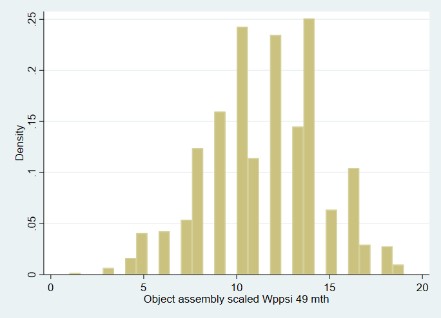The Avon Longitudinal Study of Parents and Children (ALSPAC) assessed their cohort members (CMs) at 49 months’ age (Children in Focus Clinic) using the Object Assembly measure from the Wechsler Preschool and Primary Scale of Intelligence Revised (WPPSI-RUK).
Details on this measure and the data collected from the CMs are outlined in the table below.
| Year of data collection: | 1996-1997 |
| Domain: | Non-verbal reasoning |
| Measures: | Spatial visualization |
| Non-verbal reasoning | |
| Simultaneous processing | |
| visual-motor coordination | |
| Dexterity | |
| Non-verbal concept formation | |
| CHC: | Gf (Fluid intelligence) |
| Gs (Processing speed) | |
| CLOSER Source: | Explore this sweep in CLOSER Discovery: ALSPAC Early Years (13 months to 4 years 11 months) (opens in a new tab) |
| Administration method: | Trained interviewer; clinical setting; physical task |
| Procedure: | The child was presented with the pieces of a puzzle in a standard arrangement and was asked to fit the pieces together to form a meaningful whole within 90 seconds. A total of six trials were administered. The child was assisted if they did not correctly complete the first puzzle (not scored). For the first two puzzles, the interviewer could prompt the child with phrase "now hurry", as young children often struggle to grasp the concept of being timed. Points were awarded for the correct number of junctures (where two pieces join), with bonus points added for correctly completed trials. Raw scores were converted into scale scores using tables provided in the WPPSI-R manual. |
| Link to questionnaire: | http://www.bristol.ac.uk/alspac/researchers/our-data/clinical-measures/ (opens in new tab) |
| Scoring: | Standardised score (M = 10, SD = 3) |
| Item-level variable(s): | Not readily available |
| Total score/derived variable(s): | cf801 Explore this variable in Discovery: ALSPAC Children in Focus 4Mth-61Mth Clinics Dataset (opens in a new tab) |
| Descriptives: | Raw score |
| N = 1,023 | |
| Range = 1 - 19 | |
| Mean = 11.42 | |
| SD = 3.11 | |
(click image to enlarge) |
|
| Age of participants (weeks): | Mean = 212.39 weeks, SD = 1.63, Range = 207 - 221 |
| Other sweep and/or cohort: | ALSPAC – Age 8.5 – WISC-III Object Assembly |
| Source: | Wechsler, D. (1989). Wechsler Preschool and Primary Scale of Intelligence-Revised. WPPSI-R. Psychological Corporation. |
| Technical resources: | Kaufman, A. S., & Lichtenberger, E. O. (2000). Essentials of WISC-III and WPPSI-R Assessment. John Wiley & Sons Inc. |
| Example articles: | Gathercole, S. E., Briscoe, J., Thorn, A., Tiffany, C., & ALSPAC Study Team. (2008). Deficits in verbal long-term memory and learning in children with poor phonological short-term memory skills. The Quarterly Journal of Experimental Psychology, 61(3), 474-490. |
| Taylor, C. M., Kordas, K., Golding, J., & Emond, A. M. (2017). Data relating to prenatal lead exposure and child IQ at 4 and 8 years old in the Avon Longitudinal Study of Parents and Children. Neurotoxicology, 62, 224-230. |
For the named item in the table above, a link is provided to the corresponding CLOSER Discovery content.
Go to:
- Overview of all cognitive measures in ALSPAC
- Overview of childhood cognitive measures across all studies
This page is part of CLOSER’s ‘A guide to the cognitive measures in five British birth cohort studies’.
